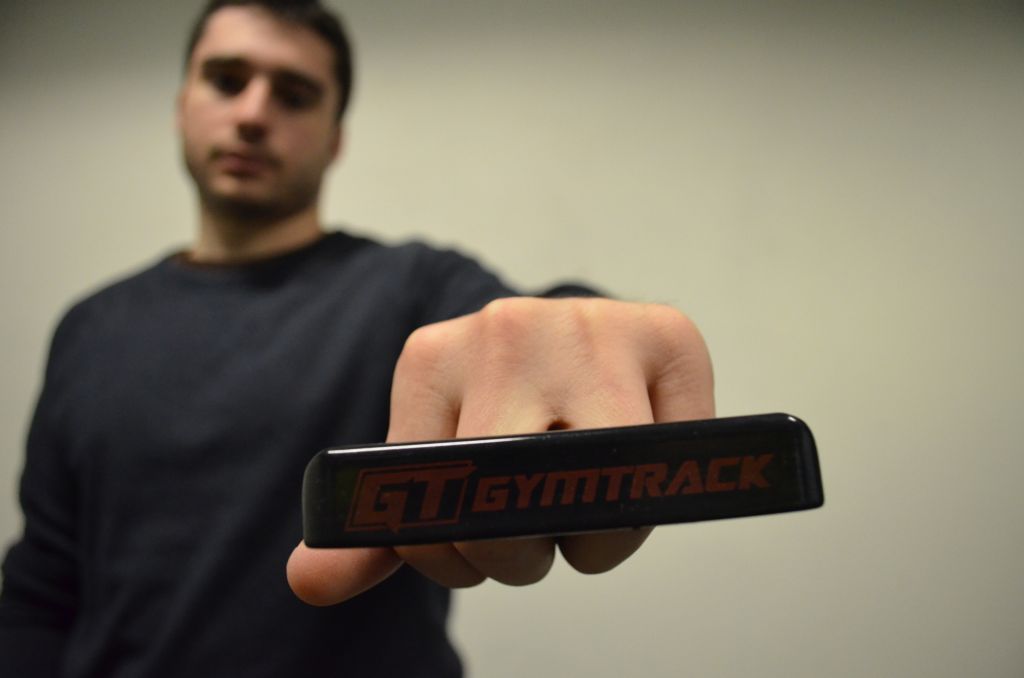Stepping into the gym, a student quickly attaches her wrist sensor. As she approaches the machine, she plugs in her headphones, but not for music.
As she sits down and prepares to lift, a soft voice speaks into her ear, “Last week you did 10 reps at 80 pounds. This week, try 10 more pounds.”
This is not the workout scene of the newest sci-fi blockbuster, but the future of fitness that is coming to the Algonquin Fitness Zone early next year in the form of Gymtrack.
It’s an innovative technology that uses a series of sensors to automatically track your movements and progress as you work out, allowing you to focus more on your workout without having to keep track of the details.
“Elite athletes use these types of things already but they use sensors that are more expensive and more complicated. We’re bringing that to the masses,” said Pablo Srugo, co-founder of Gymtrack and a graduate from the economics program at Carleton University.
The Algonquin Fitness Zone will be the site for the beta version of Gymtrack. Students will be able to grab a wrist sensor free of charge after they sign up to the Gymtrack app and website, and then have their workouts and progress tracked automatically.
The sensors read your movements and weights to build algorithms, analyzing various metrics such as force, tempo, explosiveness and many others. As they gather more data through their alpha and beta tests, eventually the algorithms will even be able to help you correct your form.
“You’ll be able to see a pattern and know that that is the perfect bicep curl,” said Srugo.
While some personal trainers have voiced worry to Srugo, he believes that if anything it will improve the personal training experience for both the trainer and the trainee.
“A lot of what a personal trainer has to do is marking down the weights people do and the reps. That is not what people become a personal trainer for,” said Srugo.
With Gymtrack, trainers no longer have to jot down notes and can now focus on the value that they truly bring to clients, which is motivation, advice and suggestions.
Srugo and his longtime friend Lee Silverstone, a graduate from the health sciences program at the University of Ottawa, thought of the idea of Gymtrack just 12 months ago. A year later, they just returned from a trip to Silicon Valley where they were voted top pitch by various publications in the 500 Startups program without even ever having applied to the program.
“Lee was just pitching people left right and centre,” said Srugo. “Then someone told him he should talk to Dave McClure (who runs 500 Startups, a program that connects promising startups with investors, partners and a large mentor network to help them develop) and we didn’t even know who he was. So Lee pitches him on Friday. On Saturday they met again for drinks and he basically said that our idea was awesome, we were now in 500 startups, here’s $100,000 dollars in investments, come to Silicon Valley on Monday.”
But things haven’t always been so smooth.
“It has its ups and downs. At the beginning when you’re doing proof of concept and you’re trying out eight different sensors to see if they work, you’re wondering if it will even work at all,” said Srugo.
With the help of 500 Startups, Gymtrack has recently completed its first round of financing, garnering about $750,000 in anticipation of expansion. They’ve gone from having a single cubicle to having 11 full-time employees, two of which were hired on through Algonquin’s Applied Research and Innovation (ARI) department.
“At the end of my term with ARI, I just came in the next Monday and kept working,” said Tristan Marquis-Huer, a recent graduate of the software development program at Algonquin.
The ARI department matches clients with students based on their needs and skill sets, and allows them to get paid, real-world experience that is directly related to their field.
Marquis-Huer works on both the app and the website, and is extremely excited to watch Gymtrack grow. “It puts the pressure on but I don’t really worry about it,” he said.
“It’s a good experience and gives you a chance to work in your field,” said Kelly Seay, a graduate of the graphic design program.
Seay was hired on as a graphic designer for Gymtrack after she worked for them through ARI for four months. She primarily helps create posters, sales and marketing materials.
Srugo emphasizes that Gymtrack isn’t just for the hardcore weightlifters.
“When you first start it’s a great way to keep track of things and not get intimidated,” he said.
Gymtrack will arrive at the Fitness Zone early next year.



